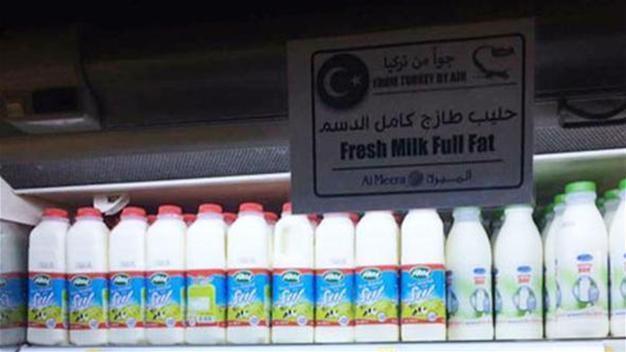Turkish products hit Qatar shelves as blockade remains
DOHA

Turkish products are meeting high demand in stores across Qatar, which is facing an economic blockade from fellow Arab countries, as Iran is also sending food to Doha amid concerns of shortage.
Qatar has been in talks with Iran and Turkey to secure food and water supplies after Saudi Arabia, the United Arab Emirates, Egypt and Bahrain cut links, accusing Doha of supporting terrorism. Saudi Arabia has also closed its land borders with Qatar, geographically isolating the Gulf state.
Turkey has stood by Qatar, as President Recep Tayyip Erdoğan on June 9 said, “We will not abandon our Qatari brothers.”
Ankara moved to send stockpiles of food and water supplies aboard cargo planes to Qatar. Qatari market chains announced on social media that daily food products from Turkey such as milk, yogurt and chicken were now on the shelves with signs “from Turkey by air.”
“Everything is going fine in Qatar,” Suhail Awad, a Qatari shopper in Doha, told state-run Anadolu Agency.
“We are now buying Turkish products,” he said. “For the first time, my son will drink milk coming from Turkey.”
Iran also has sent four cargo planes of food to Qatar and plans to provide 100 tons of fruit and vegetable every day, Iranian officials said.
“Following the proposed sanctions on Qatar, IranAir has so far transported food and vegetables to this country by four flights,” Shahrokh Noushabadi, the head of public relations at Iran’s national airline, was quoted as saying by Fars news agency on June 10.
The head of the industries, business and trade organization in the Fars province, Ali Hemmati, told Tasnim news agency on June 11 the first planes carrying food to Qatar had flown from the southern city of Shiraz.
“Every day we will export 100 tons of fruits and vegetables to Qatar,” Hemmati said.
Qatar, a small peninsular nation of 2.5 million people, was importing 80 percent of its food requirements from bigger Gulf Arab neighbors before they cut ties with it.
Iran, long at odds with Saudi Arabia and a behind-the-scenes target of the move, has called for the sides to overcome their differences.
 Turkish products are meeting high demand in stores across Qatar, which is facing an economic blockade from fellow Arab countries, as Iran is also sending food to Doha amid concerns of shortage.
Turkish products are meeting high demand in stores across Qatar, which is facing an economic blockade from fellow Arab countries, as Iran is also sending food to Doha amid concerns of shortage.